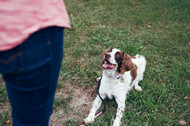Can You Train an Old Dog? Discover The True Answer to This Age Old Question
Apr 1st 2024
So you've recently rescued an old dog from a shelter. One that was probably abused, neglected, or very poorly trained. As the responsible dog owner you are, you want to ensure that your new family member is safe, healthy, and well behaved. but you're uncertain whether your dog can adapt to its new environment and be properly trained. Fear not my fellow dog lover, you're not alone in this journey! Let's delve into some insightful advice and practical tips from experienced dog owners and professionals about training older pups.
How Old Is Too Old To Train A Dog? The Truth is...Its Never Too Late to Learn
That's right! Whoever invented the phrase "You can't teach an old dog new tricks" was lying, because the resounding consensus among dog owners and professionals is that it's never too late to train an older dog. Dogs, even at a mature age, are capable of learning new, positive behaviors and habits. Whether your dog is pushing seven or sailing past thirteen, they've still got plenty of potential to pick up new skills. Heck, I've even got a friend who recently taught her 13 yr old corgi how to use a pee pad. As long as you approach their training with patience, consistency, and the right techniques, your dog can be very capable of learning new skills.
Starting Small
Begin your training journey by starting small. Start by taking your dog for short walks around your backyard on a leash. This gives them exposure to new sounds and smells in a safe, isolated environment. Think of it like studying at home or a library in quiet area in preparation for a big test. Repetition and learning in a quite environment is super helpful. Especially for dogs! If your dog is a strong dog that likes to pull, it is recommended to use a gentle lead that goes over their nose and naturally pulls their head down and to the side so they can't use full force. Once they are used to your yard, you can progress to your neighborhood as long as you are confident you control them in case of unexpected distractions. A pro tip is to start early in the morning and at night to avoid distracting or unsettling noises. Use positive reinforcement techniques, such as treats and praise, to encourage positive behaviors like walking calmly on a leash and paying attention to you when issuing commands.
Professional Assistance
Consider seeking assistance from a certified dog trainer, especially if you're facing challenges or dealing with specific behavioral issues. Although a trainer can be expensive, the guidance and expertise they provide can be invaluable in addressing your dog's needs effectively. If you are considering a trainer, It is strongly advised to conduct proper research and due diligence beforehand. The dog training industry is not regulated and the barrier for entry is pretty much zero. Good trainers do exist but they are often buried under less than savory trainers who happen to be better at marketing. One good tip is to look for a trainer that practices strictly positive reinforcement based methods only. And remember, patience is key! Rome wasn't built in a day, and your dog won't become a canine Einstein overnight.
Online Resources
For those on a budget or seeking additional guidance, online resources such as YouTube can be a treasure trove of training tips and tutorials. Renowned trainers like Kikopup and Zak George offer comprehensive guides on positive reinforcement training methods, which can be particularly effective for older dogs. It's like getting a crash course in Doggie 101 without ever leaving your couch.
Harnessing the Power of Positive Reinforcement
When it comes to dog training, I strongly believe that bribery is totally acceptable. In fact, it is encouraged! Positive reinforcement is key when it comes to successful training, especially for older dogs. Reward desired behaviors with treats, praise, their favorite fruits, snack and even jackpot rewards for exceptional efforts. This encourages your dog to associate training with positive experiences, making the learning process enjoyable for both of you. Pftt! Who says you can't buy love?
Overcoming Challenges
While training an older dog may present unique challenges, such as ingrained habits or behavioral issues, patience and consistency are your allies. Break training tasks into manageable steps, address one behavior at a time, and celebrate each small victory along the way. It may not be as easy as training puppies, but hey, we're dog owners, right? We're used to a little drama. Just take it one bark at a time and celebrate the wins, no matter how small.
Prioritizing Safety
Safety should always be a priority when training your old dog, particularly when introducing them to new environments or encounters with other dogs. Utilize appropriate training equipment, such as front clip harnesses or gentle leaders, to ensure control and minimize pulling.
Building Confidence
Help your dog build confidence in unfamiliar situations by gradually exposing them to new stimuli, such as other dogs or people, while maintaining a safe distance. Reinforce calm and attentive behavior with rewards, gradually decreasing distance as your dog becomes more comfortable. Remember, Whether it's meeting new furry friends or braving the big, bad world outside, a little positive reinforcement always goes a long way.
Celebrating Progress
Finally, celebrate the progress you and your dog make together on your training journey. Each successful walk, mastered command, or moment of connection strengthens the bond between you and reinforces the positive impact of training on your dog's well-being.
There you have it folks. it's never too late to embark on a training journey with your older dog. With patience, perseverance, and the right approach, you can unlock your dog's potential and enjoy the rewards of a well-trained and happy companion. So, lace up those walking shoes, grab some treats, and let the training adventures begin!

